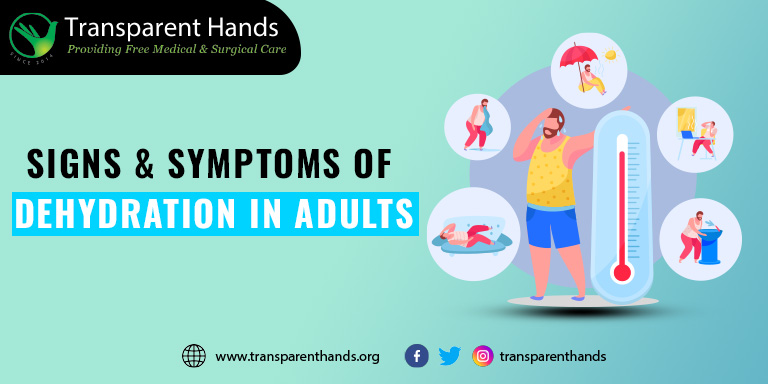Signs and Symptoms of Dehydration in Adults

Dehydration occurs when the body loses more water than it consumes, and it can have devastating effects. In addition to causing fatigue and lethargy, dehydration can lead to a host of other problems, such as kidney stones, urinary tract infections, and even seizures. Consequently, it is essential to understand the signs and symptoms of dehydration in adults so that you can recognize it early and take measures to prevent it.
Importance of Staying Hydrated in Summer
In the summer, when the weather is hot and humid, it is especially important to drink plenty of water to replace the fluids lost through sweating. Dehydration in adults can cause fatigue, headaches, dizziness, and even heatstroke.
Water helps regulate body temperature, flush out toxins, transport nutrients, and lubricate joints. Dehydration makes these functions harder, making you tired and sluggish. Drinking water and other fluids throughout the day prevents dehydration. If you’re active or spend time outside in the heat, you may need more than 8 cups (64 ounces) of water per day. Herbal tea, fruit juice, and sports drinks can also hydrate you, but choose low-sugar options.
Negative effects of dehydration on our bodies
- Taking fewer fluids can result in heat exhaustion, which is characterized by heavy sweating, nausea, fatigue, and headaches.
- Heatstroke is a potentially fatal condition in which the body’s internal temperature rises to extremely high levels due to severe dehydration. High body temperature, rapid heart rate, confusion, seizures, and loss of consciousness are all symptoms of heatstroke.
- Dehydration can interfere with physical performance, making it more difficult to participate in sports or exercise.
- When the body is dehydrated, urine becomes concentrated, which can increase the risk of kidney stones.
- Dehydration can lead to dry, flaky skin and exacerbate conditions like eczema and psoriasis.
Signs and Symptoms of Dehydration in Adults
Here are some signs and symptoms of dehydration:
Thirst
One of the most common and earliest signs of dehydration in adults is feeling thirsty. The body sends signals to the brain when it needs more fluids, prompting us to drink water.
Dry mouth and throat
The salivary glands in your mouth may not produce enough saliva when you are dehydrated, resulting in a dry mouth and throat. Also, this can make the food difficult to swallow.
Dark yellow urine
Urine color can indicate hydration levels. If you are dehydrated, the color of your urine could be dark yellow or amber. If you are adequately hydrated, your urine will be pale yellow or nearly clear.
Fatigue and weakness
Additionally, dehydration can cause fatigue and weakness. This occurs because your body is not receiving enough fluids to function properly, which can lead to fatigue.
Headache
Dehydration can induce headaches, particularly when it is severe. Dehydration causes the brain to shrink slightly, which pulls on the membranes that cover the brain, causing pain.
Dizziness or lightheadedness
If you are dehydrated, you may feel dizzy or lightheaded, especially if you stand up quickly. This happens because dehydration causes a drop in blood pressure, which causes dizziness.
Dry skin
Dehydration can lead to skin that is dry and flaky. This happens when your body doesn’t get enough water to keep your skin moist.
Rapid heartbeat
The heart rate may also increase due to dehydration. This occurs because your body is attempting to make up for the dehydration by pumping more blood.
Confusion
Disorientation, confusion, and even hallucinations have been linked to severe dehydration.
Six Ways to Prevent Dehydration
1. Drink water
Drinking plenty of water throughout the day is the best way to avoid symptoms of dehydration in adults. Drink at least eight glasses of water every day; more is recommended if you exercise or if the weather is particularly hot.
2. Eat water-rich foods
The high water content of many fruits and vegetables can be used to aid in hydration. Watermelon, cucumbers, strawberries, and lettuce are all examples of fruits and vegetables.
3. Avoid sugary drinks
Sugary drinks like soda and juice may dehydrate you. Water, unsweetened tea, and other low-sugar drinks are best.
4. Take breaks in hot weather
In hot weather, take frequent breaks in a cool, shaded area to avoid overheating and dehydration.
5. Rehydrate after exercise
Drink water before, during, and after your workout to replenish the fluids you’ll lose through sweat.
6. Seek medical attention for severe dehydration
It is important to seek immediate medical attention in cases of severe symptoms of dehydration in adults because they can be potentially fatal.
Endnote
Dehydration in adults can have severe consequences, but it is preventable through adequate hydration and self-care. By recognizing the warning signs of dehydration and taking measures to prevent or treat it, you can maintain optimal bodily health and performance. To stay hydrated, drink plenty of fluids, consume water-rich foods, and maintain a cool body temperature during hot weather.
(The information in this article should not be taken as a substitute for professional medical advice.)










Leave Your Comments